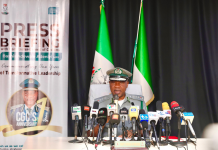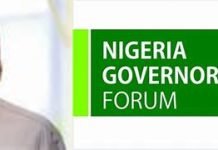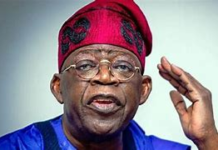Joseph Adumaza Sanni
The National Single Window (NSW) is already here with very little that needs to be done to achieve international/global standards of Single Window. Simply install rugged scanners harmonize all stakeholders systems to interact seamlessly and electronically, and we are as good as any single window-developed environment.
It is no rocket science and does not need any money-guzzling, professionally-unrelated committees to achieve that. We can develop the home grown application to suite the harmonization of all the documents from all relevant agencies interacting in the cargo clearance process. After all, Pre-Arrival Assessment Report (PAAR) was a home grown initiative by Nigeria Customs Service (NCS), leveraging on our well-trained young officers, during the administration of the late Comptroller General of Customs (CGC), Alhaji Dikko Inde Abdullahi.
Same goes for invoicing, payment and releasing of cargoes from the shipping companies and terminal operators. These processes are done online since most of these stakeholders have automated their processes. So, no human interaction is involved. Once done, Nigeria Customs Service sees all of the releases online and effects their own releases therefrom.
NAFDAC and SON have since innovated on this for long and linked their releases with Nigeria Customs Service. The transactions are getting more and more paperless and online. Nigeria should stop being deceived by so-called foreign experts, as the world is now a global, interconnected information-enabled village. What they want to do is what we already know via the internet. Let us also leverage on the information available online to do the needful here in Nigeria.
Enough of these rigmarolling. Single window is achievable with minimal or no interference from foreigners. With the Nigerian Integrated Customs Information System (NICIS II), we are prepared to share cargo clearance documents electronically, by simply uploading same for necessary actions/reactions.
Once we are able to arrange a puplic private partnership (PPP) with those ready to invest in scanners and the spare parts manufacturers and we are also ready to train our locales on how to handle the scanners and fix them once they develop abnormalities, and we ensure that personnel are appropriately trained, then we are good to go. Enough of this back and forth on the national single window issue.
One thing we must not lose sight of is the fact that the Nigeria Customs Service is the lead agency in the ports and border stations, and should be directed to conclude the single window process which by the estimation of this interventionist has reached 65 percent implementation level. This has been captured in the enabling Acts of Nigerian Ports Authority and the Nigeria Customs Service.
Nigeria Customs Service should invite any relevant agency into the port to witness physical examination and not them forcing themselves on Nigeria Customs and even dictating, as in most cases, to Customs via blackmail and intimidations. It is the lack of trust and necessary synergy that has disrupted what should be the norm. This disruption has given other agencies the guts to interfere with the cargo clearance process without cogent reasons but pecuniary.
If any cargo is suspected by any security agency, such information should be shared with Customs before releases are effected, and not to stop cargoes already released from exiting the ports or intercepting same on the highway. Once that happens, somebody should be held responsible for the release of the cargo.
An executive order needs to be enacted to establish this fact so that none of these agencies claim some high ground, especially holding Nigeria Customs to ransom via blackmail. One thing that should be noted at this point, is the fact that cargo clearance begins with the banks, when they forward electronically all relevant documents (Form M, packing list, SONCAP/Permit and Invoices) to Nigeria Customs Service to issue PAAR on a consignment, upon which a data capture is done in the confines of the licensed customs broker’s office or at an independent service provider outlet – DTI.
Payment is effected through the banks even before the arrival of the vessel bearing the shipment. The only snag is that consignments are designated for particular customs commands and terminals thereof, because of the revenue targets given to every command, in which case, a rotation number has to be confirmed to know exactly where the cargo will be domiciled, for payment to be made to the command. Once the shipment arrives and the cargo is discharged, inspection/physical examination formalities commence. That is for now, until scanners are installed and fully operational. Results of the scanning is analyzed, stored and retrieved when required.
Once the examination report exonerates the cargo from any discrepancies, the cargo automatically exits the ports on approval. For physical examination, the phone numbers and emails of consignees’ customs brokers should be embedded on the declaration forms or SGDs, in order to facilitate contacting owners of cargoes to report for physical examination.
Likewise, exited, compliant cargoes owners/brokers should be contacted to evacuate their cargoes from the ports. Nigerians must take full advantage of ICT tools to facilitate trade across international boundaries. These processes takes place electronically, without human interface and maximizes revenue while diminishing revenue leakages and ensuring maximum security of the cargo and nation. Once there are issues, the cargo is subjected to further confirmatory checks. That is normal, to ascertain the actual contents of the cargo.
Nigeria Customs Service, Tin Can Port Command has showcased this on its information board/screen at the lobby of the command where it is confirmed that compliant cargoes do not stay a minute longer than expected. This is expected to be showcased in all the commands.
Again, that is why there is need for an established data collection, analysis and profiling unit, which will record all imports and exports, such that any cargo’s status can be determined before it is discharged from the vessel. Nigeria can do it without all these back and forth by those who do not understand cargo clearance in the ports and border stations, and obviously do not mean well for Nigeria.
Enough of deceiving Nigerians that also have comparative analysis access to what is obtaining in other climes via the internet. That apart, we have institutions and experts that when engaged, can give Nigeria what it deserved without the high-sounding dollar-tied so called expert’s advice that does not make any economic sense.
Importantly, we should ensure the total illumination of the terminals for 24/7 activities/operations to take root and, especially providing requisite facilities/amenities for personnel that will be working on shift basis, in order to fast-track cargo clearance in the ports and border stations across all international boundaries.
A robust network service provider is a sine qua non for a real, uninterrupted trade facilitation. Servers must not breakdown in the course of cargo clearance. If it does, service providers must take full responsibility for it and pay for the losses at the times the server is down. From my studies/survey of the impact of server breakdown on cargo clearance in Tin Can Port, I have discovered that peak time pressure causes server to breakdown as one of five causes of server breakdowns. Bring on stream many more network server service providers and have zero or minimal server downtime.
Nigeria can do it with requisite political will and with a conviction of the outcomes that will eventually benefit Nigerian government, people, importers and exporters.
*Sanni, a licensed customs agent and former National Publicity Secretary, Association of Nigerian Licensed Customs Agents (ANLCA) writes from Lagos.











